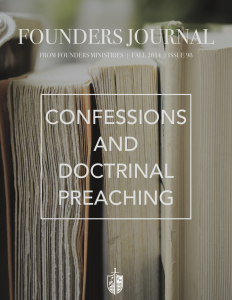Second London Confession
Chapter 18
The Character of Biblical Assurance
This chapter suggests four major points to be considered on the issue of assurance of salvation. There is enough material in each point for a series of four sermons on the issue. Each paragraph will be quoted followed by a suggested expositional outline. I would also recommend for expositional ideas Spurgeon’s sermon, preached May 13, 1888, on The Blessing of Full Assurance (1 John 5:13).
18:1 Although temporary believers and other unregenerate men, may vainly deceive themselves with false hopes and carnal presumptions of being in the favor of God and in a state of salvation, which hope of theirs shall perish; [a] yet such as truly believe in the Lord Jesus, and love Him in sincerity, endeavoring to walk in all good conscience before Him, may in this life be certainly assured that they are in the state of grace, and may rejoice in the hope of the glory of God, [b] which hope shall never make them ashamed [c].
[a] Job 8:13,14; Matthew 7:22,23 [b] 1 John 2:3, 3:14,18,19,21,24, 5:13 [c] Romans 5:2,5
I. A Well-founded assurance of salvation is possible
A. Some may profess with great certainty that they are saved, but do not have the root of the matter in them. Jesus warned that some will say Lord, Lord, but have never had the heart to love and obey Christ (Matthew 7:21–23). Hebrews has warning for those that appear to be among the people of God but still have an evil heart of unbelief (3:12).
B. True Believers may, in this life, discover a well-founded assurance that they have indeed been redeemed by Christ. John wrote his first letter largely to give true spiritual knowledge of the possession of eternal life. “These things have I written to you that believe in the name of the Son of God that you may know that you have eternal life” (1 John 5:13).
C. Jonathan Edwards wrote, “There is no question whatsoever, that is of greater importance to mankind, and that it more concerns every individual person to be well resolved in, than this, what are the distinguishing qualifications of those that are in favor with God and entitled to his eternal rewards?” (Religious Affections, preface).
18:2 This certainty is not a bare conjectural and probable persuasion grounded upon a fallible hope, but an infallible assurance of faith, [d] founded on the blood and righteousness of Christ revealed in the Gospel; [e] and also upon the inward evidence of those graces of the Spirit unto which promises are made, [f] and on the testimony of the Spirit of adoption, witnessing with our spirits that we are the children of God; [g] and as a fruit thereof, keeping the heart both humble and holy [h].
[d] Hebrews 6:11,19 [e] Hebrews 6:17,18 [f] 2 Peter 1:4,5,10,11 [g] Romans 8:15,16 [h] 1 John 3:1–3
II. Assurance is based on a network of identifiable evidences, both objective and subjective
A. Genuine assurance has an objective foundation
- The blood and righteousness of Christ are the two immutable things in which it is impossible for God to lie. The completed work of Christ guarantees that God will save sinners. Consider the possibility that the “two unchangeable things” of Hebrews 6:18 are defined for us in 7:26–28, from which the confession probably derived the phrase “the blood and righteousness of Christ.”
- Because of the nature of substitution, ransom, propitiation, and redemption, the price that Christ paid will certainly achieve its gracious purpose in a manner consistent with justice. A sinner can find true assurance only because it is sure that God through His Son will save those given to Him.
- He will save sinners who hear and believe the gospel.
B. Genuine assurance has a subjective reality
- Those who savingly hear loathe their sin, repent of it, and desire union with Christ in His righteousness.
- They love the brethren and increase in that love, desire holiness and increase in that holiness.
C. Genuine assurance has a Spirit-affirmed rational basis
- The witness of the Spirit with our spirit is not a special revelation to us that we are saved. This is not a witness to our Spirit, but with our spirit, that is, the rational, moral consciousness of man.
- Rather, as we examine our lives in light of the revelation of God’s Word, the Spirit gives illumination so that our mind and heart find rest in the evidence of conformity to the biblical evidences of a genuine work of the Spirit.
- Jonathan Edwards, in Religious Affections, wrote, Paul’s meaning “is not to be understood of two spirits, that are two separate, collateral, independent witnesses,; but ‘tis by the evidence, by infusing and shedding abroad the love of God, the spirit of a child, in the heart; and our spirit, or our conscience, receives and declares this evidence for our rejoicing.”
Benjamin Keach: “So the Holy Ghost gives in such clear demonstration and proof to the clearing up of a man’s evidence for heaven, that when all cases are clearly considered, a poor saint, though doubtful before, come to a good and full satisfaction therein. God’s Spirit and conscience compares a man’s state with the word of God; and if upon trial, it appears that those qualifications are wrought in his heart, that the word expressly mentions, concerning the truth of grace, he then finds he hath no more cause to doubt of the goodness of his condition.” [Types and Metaphors, 519f]
D. Genuine Assurance produces holy humility
- Genuine assurance does not say “Let us continue in sin that grace may abound.”
- It does not produce self-confidence or spiritual arrogance.
- It focuses on the mercies of God and purely unmerited status of salvation granted by the grace of God.
- “Assurance will make us love God and praise him.”
- “Assurance will drop sweetness into all our creature enjoyments.”
- “Assurance will make us active and lively in God’s service.” [These last three points are from Thomas Watson, A Body of Divinity.]
18:3 This infallible assurance does not so belong to the essence of faith, but that a true believer may wait long, and conflict with many difficulties before he be partaker of it; [i] yet being enabled by the Spirit to know the things which are freely given him of God, he may, without extraordinary revelation, in the right use of means, attain thereunto: [k] and therefore it is the duty of every one to give all diligence to make his calling and election sure, that thereby his heart may be enlarged in peace and joy in the Holy Spirit, in love and thankfulness to God, and in strength and cheerfulness in the duties of obedience, the proper fruits of this assurance; [l]—so far is it from inclining men to looseness [m].
[i] Isaiah 50:10; Psalm 88; Psalm 77:1–12 [k] 1 John 4:13; Hebrews 6:11,12 [l] Romans 5:1,2,5, 14:17; Psalm 119:32 [m] Romans 6:1,2; Titus 2:11,12,14
III. Because Assurance follows faith and its evidences, one must be diligent in coming to a well-founded assurance of right standing in Christ’s redemptive love.
A. True faith might be present where personal assurance is not clear [note the word “so” in the confession], Faith does contain the seed of assurance in it, but not in such a manner that it immediately and unchangingly carries assurance with it.
1. Spurgeon said: “I speak affectionately to the weaker ones, who cannot yet say that they know they have believed. I speak not to your condemnation, but to your consolation. Full assurance is not essential to salvation, but it is essential to satisfaction.”
B. Even so, one might still gain assurance by serious examination of both the promises of God in Christ and a consideration of the biblical characteristics of a work of the Spirit of God. Though such assurance is a work of the Spirit, it is not of the nature of an “extraordinary revelation.”
C. If one engages in earnest pursuit of those spiritual traits that are evidences of a changed heart and looks with gratitude to the completed work of Christ he can attain assurance that is well-founded.
- Because of the way in which one comes to assurance, it is his duty to seek it, for the very search is an exercise in practical piety.
- Cornelius Tyree, wrote, “In religion there are two fundamental propositions equally true and important; one is, as there can be no religious principle, unless it is succeeded by religious practice; so there can be no religious practice unless it is preceded by religious principle.…You may, by pruning off the dead limbs and loosening and manuring the earth around the roots of the stunted, withered tree, resuscitate it, and make it fruit-bearing. But no matter how much you may dig-about and enrich the roots of the dead tree, no matter how propitious the sunbeams and showers may be, it will remain dead.” (Tyree, The Living Epistle, chapter 5).
- Even so, giving spiritual attention and nurture to a dwarfed and stunted spiritual life will bring it to health and spiritual fruit, and be foundational to assurance.
D. Thus, assurance of salvation does not encourage indolence or unwarranted confidence but encourages one to progress in holiness and gratitude.
18:4 True believers may have the assurance of their salvation divers ways shaken, diminished, and intermitted; as by negligence in preserving of it, [n] by falling into some special sin which wounds the conscience and grieves the Spirit; [o] by some sudden or vehement temptation, [p] by God’s withdrawing the light of His countenance, and suffering even such as fear Him to walk in darkness and to have no light, [q] yet are they never destitute of the seed of God [r] and life of faith, [s] that love of Christ and the brethren, that sincerity of heart and conscience of duty out of which, by the operation of the Spirit, this assurance may in due time be revived, [t] and by the which, in the meantime, they are preserved from utter despair [u].
[n] Canticles 5:2,3,6 [o] Psalm 51:8,12,14 [p] Psalm 116:11; 77:7,8, 31:22 [q] Psalm 30:7 [r] 1 John 3:9 [s] Luke 22:32 [t] Psalm 42:5,11 [u] Lamentations 3:26–31
IV. Temporary loss of assurance caused by a multitude of factors, but grace preserves the believer from despair.
Andrew Fuller, one of the most useful pastor-theologians ever to minister in Baptist life went through deep trials of soul in 1780. In September he wrote, “Very much in doubt respecting my being is a state of grace. I cannot see that I have, or ever had, for any constancy, such an idea of myself as must be implied in true humility. The Lord have mercy upon me, for I know not how it is with me. One thing I know, that if I be a Christian at all, real Christianity in me is inexpressibly small in degree. … I mean the workings of real grace in my soul are so feeble, that I hardly think they can be feebler in any true Christian.”
A. Lack of the pursuit of those qualities of life to which assurance is promised may cause it to flag.
B. Falling into a sin—those works of the flesh described in Galatians 5:19–21—will be reason for loss of assurance. The person thus falling needs to be, and can be, restored, both to fellowship with the saints and assurance of the sonship.
C. Sometimes the mere thought of such sin that arises with suddenness and power in the heart can interrupt a believer’s sense of sonship. The sudden rising of the stench of indwelling sin can foul the spiritual perceptions of a person’s heart and cause the evidence of grace to be smothered for a while. This kind of awareness seemed to operate in Fuller’s bouts with the issue of assurance. “O wretched men that I am: who shall deliver me from the body of this death? O mine iniquity! Surely I had rather die, than feel again what I have felt of the odious risings of this unholy heart.”
D. Sometimes God will hide Himself and cast a cloud over our certainty so as to give us a deeper sense of dependence on Him.
1. Thomas Watson wrote, “God is a free agent, and may give or suspend assurance pro licito, as he pleases. Where there is the sanctifying work of the Spirit, he may withhold the sealing work, partly to keep the soul humble; partly to punish our careless walking.” Watson tends to identify assurance with the sealing of the Spirit. Though I take a different view of the sealing of the Spirit, the point concerning assurance is worth pondering.
E. When these things occur, the transforming grace of the Spirit along with all that pertains to life and godliness is not gone, but only hidden for a while.
1. Watson again: “Want of assurance shall not hinder the success of the saint’s prayers. … Faith may be strongest when assurance is weakest. … When God is out of sight, he is not out of covenant”
F. Those graces will reassert themselves at some point in the future and will operate secretly to keep the child of God from despair.
For many reasons, the professing must seek to come to a genuine and well-grounded assurance of salvation. Unreserved service to God is one of the powerful results of true assurance. Spurgeon preached, “Full assurance gives a man a grateful zeal for the God he loves. These are the people that will go to the Congo for Jesus, for they know they are his. These are the people that will lay down their all for Christ, for Christ is theirs. These are the people that will bear scorn and shame and misrepresentation for the truth’s sake, for they know that they have eternal life. These are they that will keep on preaching and teaching, spending and working, for theirs is the kingdom of heaven, and thy know it. Me will do little for what they doubt, and much for what they believe. … When you know that heaven is yours, you are anxious to get ready for it. Full assurance finds fuel for zeal to feed upon.”

















